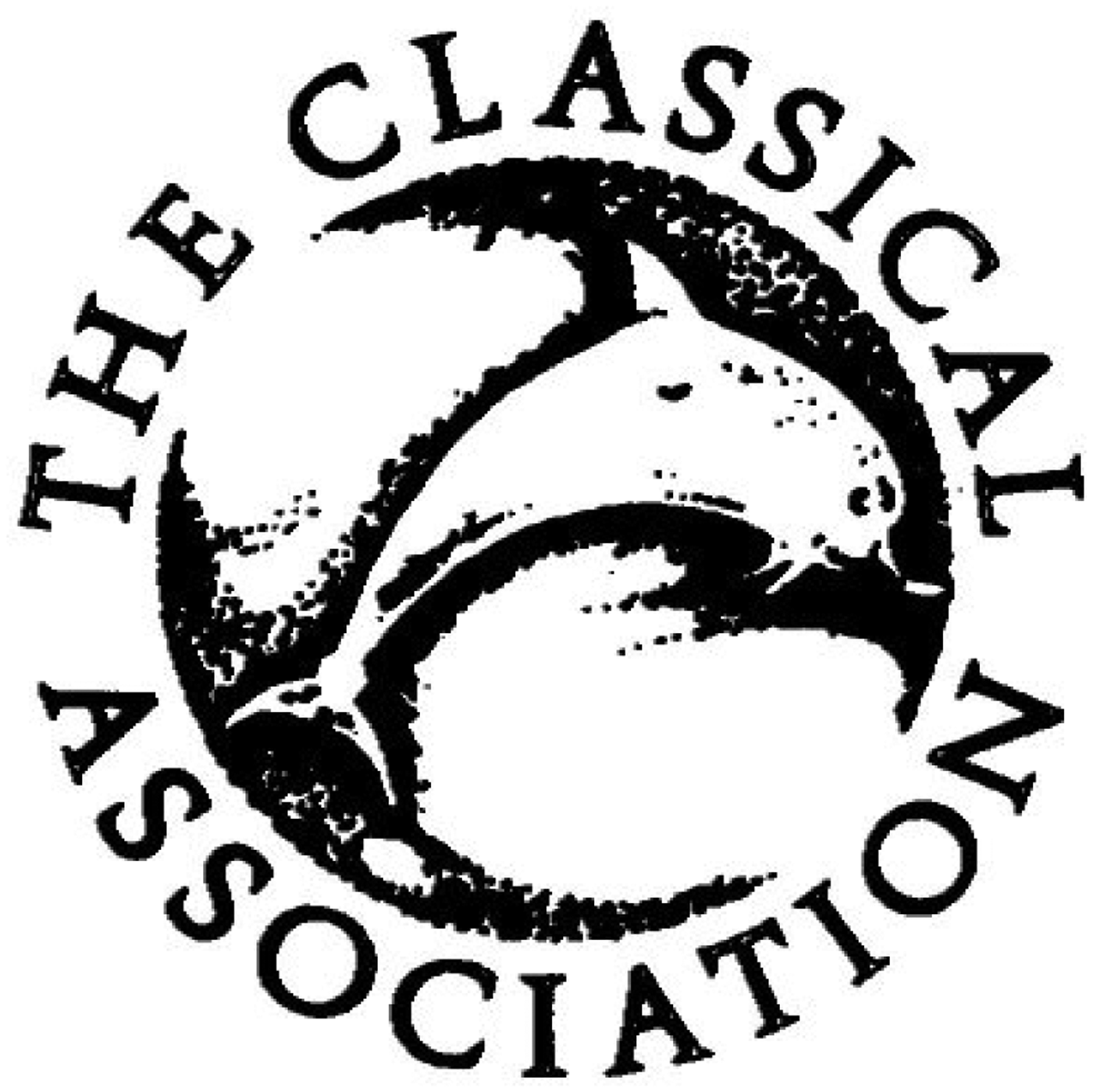
On a humid Saturday at the University of Manchester around 35 teachers of Latin gathered for a day of short talks and workshops on Latin teaching at GCSE and pre-GCSE stages. The organisers were Jessica Coatesworth and Peter Liddel and other members of the Manchester Classics for All team.
In the keynote lecture entitled Classics Now!, Steve Hunt (Cambridge PGCE Subject Lecturer) emphasised the cross-cultural aspects of Latin teaching and showcased his work in a wide range of schools in London, the Midlands and, in detail, at Elm Tree Primary Academy in Lowestoft. He made suggestions about how to sell Latin to school management, emphasising its relevance to literacy themes while also pointing up its cultural aspects: his message is that Classics in the classroom is about people not just words. He picked up some of these themes in a workshop session on Teaching Inductively, explaining the difference between language learning and language acquisition. Teaching inductively privileges understanding language in its cultural context and emphasises comprehension of narratives.
We heard accounts from schoolteachers about their introduction of Latin classes in places where the language was not previously supported or endangered: inspiring reports on this topic were offered by Liam Holian (Levenshulme High School for Girls), Martine Molyneux (Beamont Collegiate Academy), Caroline Booth (formerly Loreto High School (Manchester) and now Turton High School), Jo Carrington and Dulcima Morgan (Clevedon School). Joanne McNamara (Liverpool College) outlined ideas about starting Latin clubs and getting Latin on the school curriculum. A wide range of experiences was discussed, including introducing Latin to both aspirational and non-aspirational pupils, introducing Latin into both monocultural and multi-ethnic classrooms, and perspectives from teachers of History and MFL who have championed Latin. There was a lively discussion of the value of rote learning and ‘Socratic’ styles of learning. We discussed ways of ensuring retention in Latin classes: ensuring that pupils take the subject seriously (as well as having fun) with support from their parents is a vital aspect of ensuring the success of classes. Holly Eckhardt (Cheadle Hulme High School) talked about her experiences in introducing the WJEC GCSE at a school which had never previously offered Latin; she emphasised the importance of combining different methods in order to teach Latin effectively in a crowded curriculum.
Some afternoon sessions showcased important resources: Charlie Andrew presented her open-access Maximum Classics resource and James Watson talked about the Cambridge Latin Course and its associated electronic resources. Jonathan Goddard talked about how Latin can be supported at KS 2 without a textbook with The Latin Programme resources (https://www.thelatinprogramme.co.uk/). Specifications were discussed later on: Jessica Coatesworth and Matt Ingham (University of Manchester) and Holly Eckhardt explored aspects of the WJEC Level 1/2 and Eduqas GCSE qualifications. Over the course of the afternoon, John Taylor (University of Manchester) offered classes for those who are interested in learning Latin language.
The next session explored the organisation and running of Classics clubs, discussing ways in which Latin classes can engage with ‘Enrichment’ activities and also the role of hands-on activities, games, crafts, sounds, songs, rhythms, and kinaesthetic and mnemonic approaches; moreover, Latin classes can be a starting point for new cultural experiences. We emphasised the importance of helping learners realise what they have understood over the course of a Latin lesson. Joanne McNamara asked how we can overcome the inherent difficulties of Latin: its inflectedness, the peculiarities of word order, the lack of definite article, and the breadth of vocabulary. The next session, led by Pete Munday (Manchester Classics for All) discussed the benefits of introducing Latin in terms of engaging with gender and ethical issues. Holly Eckhardt looked at how Latin clubs might be promoted within schools (e.g. through publicity at morning assemblies) and might become the starting point of introducing GCSE to a school.
This was a very rich and informative event; the audience came out with a feeling of renewed optimism about the future of Latin at schools and the sheer amount of possibilities that there are for making Latin inspiring but also inclusive. Our concluding remarks focused on the progress that has been undertaken in terms of making Latin accessible to all but also noted regional divisions in terms of resources, expectations and approaches. Two things that were communicated very clearly were (a) the amount of hard work that is being put in by teachers into developing Latin in schools where institutional support is sometimes limited and (b) the amount of innovative resources, both online and printed, that are being developed to support Classics. It is clear that classrooms of many types are benefitting from the sense of experimentation and adventure that is currently supported by many Latin teachers.

Training is still high on the agenda at the Primary Latin Project and we are very grateful to Classics for All for their generous support. Our trainers have travelled far and wide to deliver training in many different formats: to staff in individual schools (or even to individual teachers, if there is a need) or to a number of schools in CfA hubs; to give talks; to train PGCE students – and to offer any support needed. The interest in Latin and Classical subjects is certainly growing.
During the extreme heat of last summer Barbara Bell and Helen Forte created a second Minimus workbook. It has the same format as the first workbook, providing two pages of grammar practice for each chapter of Minimus Secundus. It can be ordered through the Minimus website (http://www.minimus-etc.co.uk/). The workbooks are cunningly disguised grammar books and I know from my own experience that children are very keen to complete the activities.
Where better to celebrate 20 years since the first publication of Minimus than at Vindolanda? As mentioned in the last report, a special Minimus weekend will take place at Vindolanda over two days (Saturday, May 25th and Sunday, May 26th). Barbara and Helen and will be there, as will other members of the PLP committee and trainers. There will be a Minimus trail round the site and many other Minimus-related activities.
Please follow this link for more information:
http://www.vindolanda.com/announcements/minimus-weekend
A reminder: the closing date for this year's popular Mythology Arts Competition is April 27th. The themes are Midas (Minimus p. 63) for Level One and/or The Beauty Contest (Minimus Secundus p.76) for Level Two. New for this year is a special category for animations. For further details please see the Teachers' section on the Minimus website.
Since the last Newsletter, I am delighted to report that ten schools have received grants from PLP.
Changes to grant applications: from January 2019, the grant committee will consider applications three times per year (mid-February, mid-June and mid-October). Grants will be awarded to state schools.
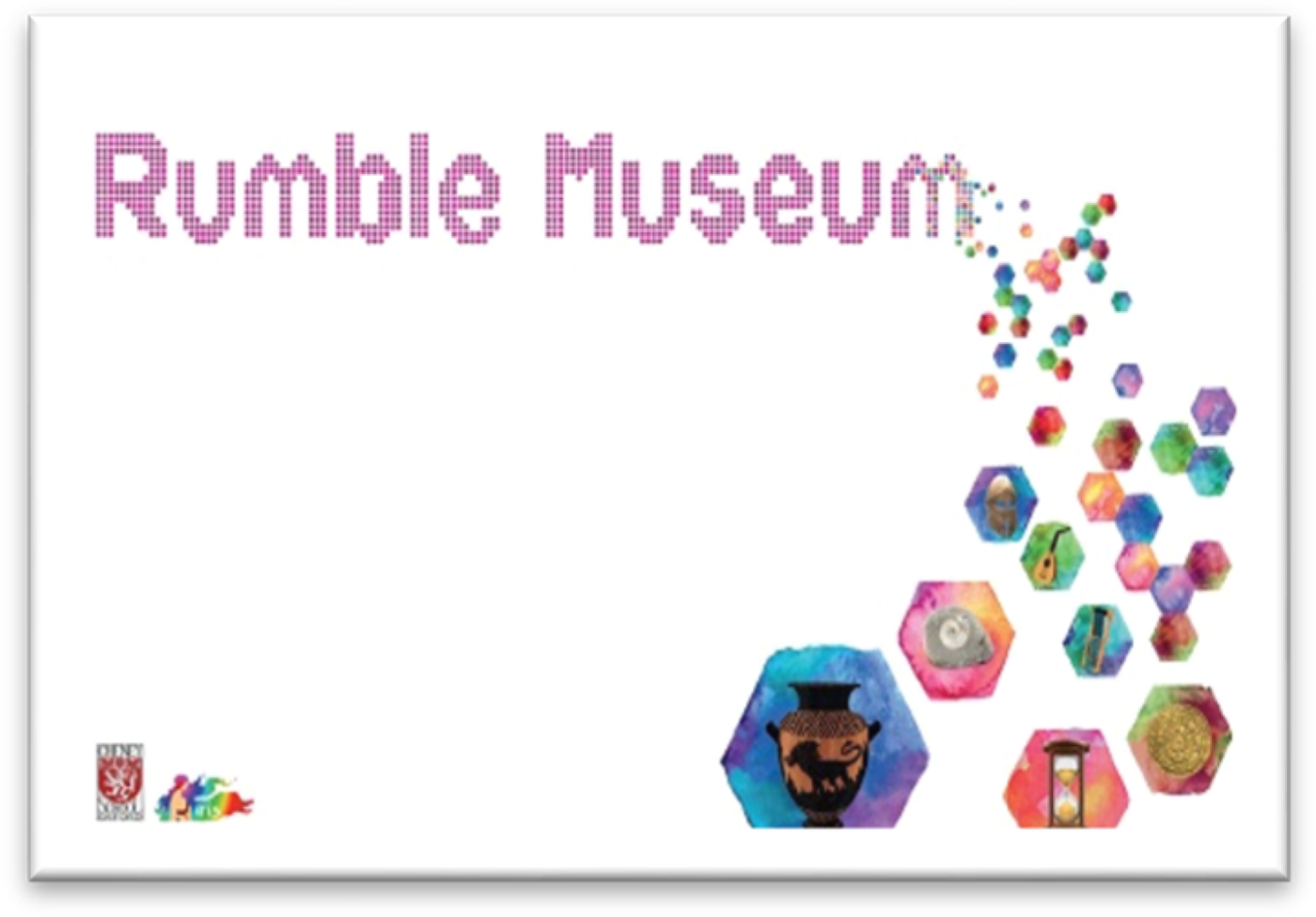
It's a particularly busy time for The Iris Project at the moment. We ran our Museum Celebration Festival on 27th March at Cheney School. The Festival celebrated our completion of the Arts Council Accreditation process, as we submit our final paperwork, and continue our journey of making Cheney School the first state school with an Arts Council-accredited museum spread throughout its school.
The Festival featured 55 organisations, including the Ashmolean, Ure Museum, British Museum, Museum of London and many other local and national museums. It also featured a large range of organisations running activities themed on Classics, natural history, archaeology, anthropology and art.
Third Edition for Telling Tales in Latin
We are delighted that Telling Tales in Latin has been reprinted by Profile Books, and is now in its third edition. We are also preparing a teacher's guide for Telling Tales in Greek, which we hope will be ready later this year.
Roman Kiln
The Museum of Oxford has very kindly donated pieces of a Roman kiln excavated from the Churchill Hospital in the 1970s. We will be displaying the kiln remains in the school reception, and will be working with Cheney students to prepare display boards for this exciting addition to our Rumble Museum collection. Cheney School is just down the road from the Churchill, so we are especially pleased to be able to display the pieces to the public.
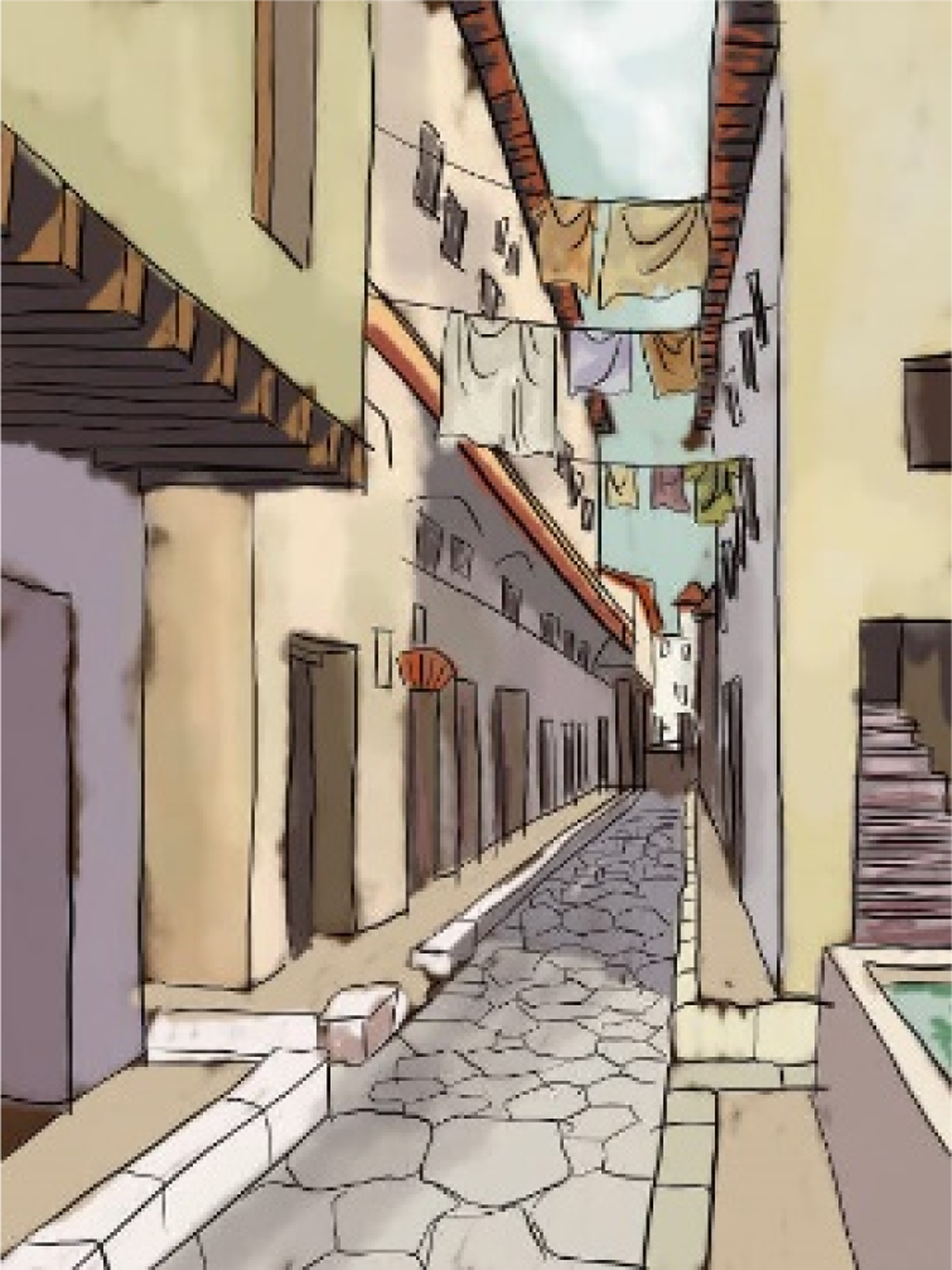
Work is progressing on the print and digital resources for our new secondary Latin reading course Suburani. We're looking forward to trialling the first book in a select number of schools in September 2019 and are grateful for all the positive feedback received so far. The first two chapters are available to view and download on our website, and we'll be talking more about the materials at our summer conference on the 15th of June. We're pleased to be collaborating with teachers in the Europe, the US and Australia and invite any teachers interested in giving feedback, trialling, or creating materials for the new course to get in touch (email to: [email protected]).
Summer conference
We will once again be holding our annual summer conference on Saturday the 15th of June, at the Museum of London. There will be sessions looking at pedagogy in the Latin classroom, the progress on our new course Suburani, as well as talks from representatives of several UK museums.
Primary Latin Course
Our Primary Latin Course is freely available online at www.primarylatin.com, and free training is available too on request. The Primary Latin Course is designed for use by teachers who have never seen any Latin before to Years 3 - 6, and is delivered entirely online. Teacher's guides, sample lesson plans and other support resources are available by writing to us (email to: [email protected]).
Online games
Catena and Arepo are our latest online Latin word games. They're free to play on our website, but be warned that they can be highly addictive! (www.hands-up-education.org/arepo/, www.hands-up-education.org/catena).
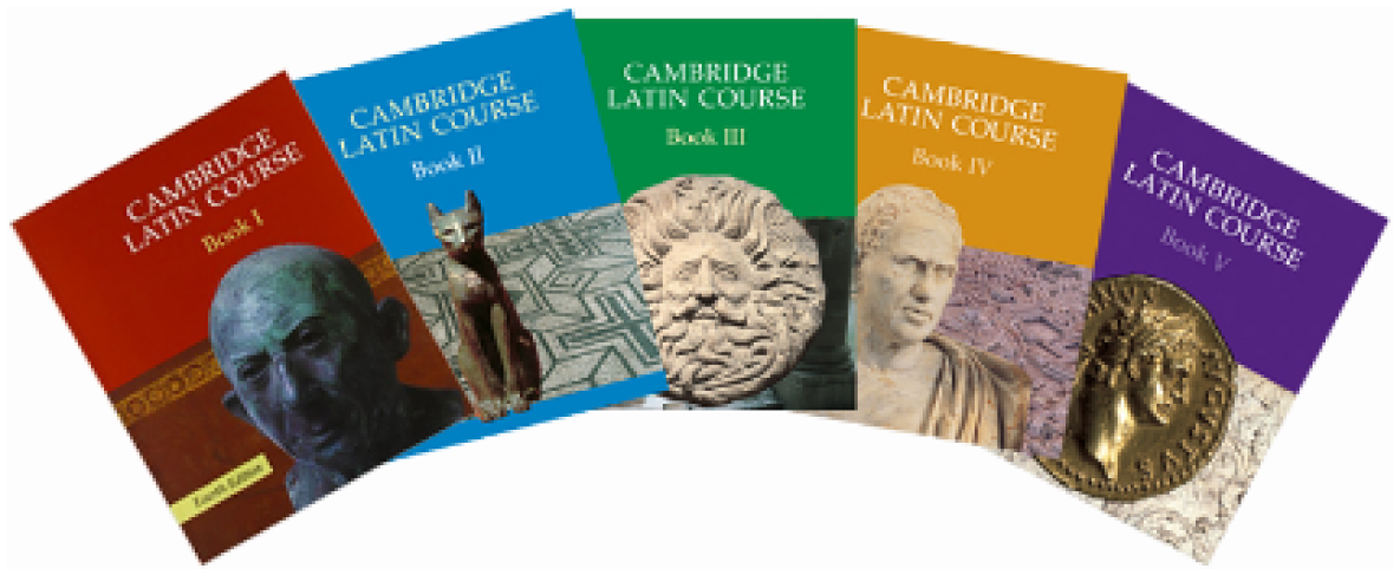
Here at the Cambridge School Classics Project (CSCP), we are very excited to be looking to the future of our well-loved Cambridge Latin Course CLC) and, in particular, at how we will go about refreshing all the UK/International 4th edition materials and online resources. We have started by involving as many teachers and learners as we can in our consultation exercise Caecilius is Listening! so that our work responds directly to their needs and wishes. So far, we have received feedback and suggestions from well over 200 collaborators and we hope to reach more!
How Caecilius has been Listening
We have already heard views via personal attendance at our launch event in November 2018, through emails, twitter, visits to PGCE students and through our online survey. We have also been visiting schools to talk to pupils and teachers.
res gerendae Caecilii
After some marathon data-analysis sessions, we have distilled seven core aims that we will be addressing:
• Preserve the integration of culture, stories and language learning
• Maintain the narrative strength of ongoing storylines and characters
• Ensure suitability and accessibility for all classrooms, with special focus on funding, time and exam pressures
• Improve representation of different sectors of society
• Update the course to reflect current views on sensitive issues and associated language
• Ensure cultural background and stories are in line with latest research
• Create a user-friendly online platform to house digital materials
We also have a long list of actions that we are prioritising with the help of all the wonderfully supportive contributors to our online survey.
Caecilius is Still Listening!
If you would like to have your say, there are still a number of ways of getting involved. You could complete our online survey, put forward your school for a visit from some of our team or apply to join the panel of teachers who will trial our new resources before they are published. All these options can be accessed via this page:
https://www.cambridgescp.com/caecilius-listening-future-cambridge-latin-course
In other News
New developments for GCSE Latin include soon-to-be published support for both Eduqas and OCR set texts. Keep an eye out for them on our qualification pages:
https://www.exams.cambridgescp.com/Array/eduqas-gcse-9-1-2018-onwards
https://www.exams.cambridgescp.com/Array/ocr-latin-gcse-9-1
Finally, we are also making rapid progress with our development of innovative KS3 History resources incorporating a wonderful new story by the amazing Caroline Lawrence and up-to-the-minute archaeological evidence from Pompeii courtesy of Dr Sophie Haye and Dr Andrew Wallace-Hadrill! All beautifully illustrated by Jenks of Greek Myth Comix!
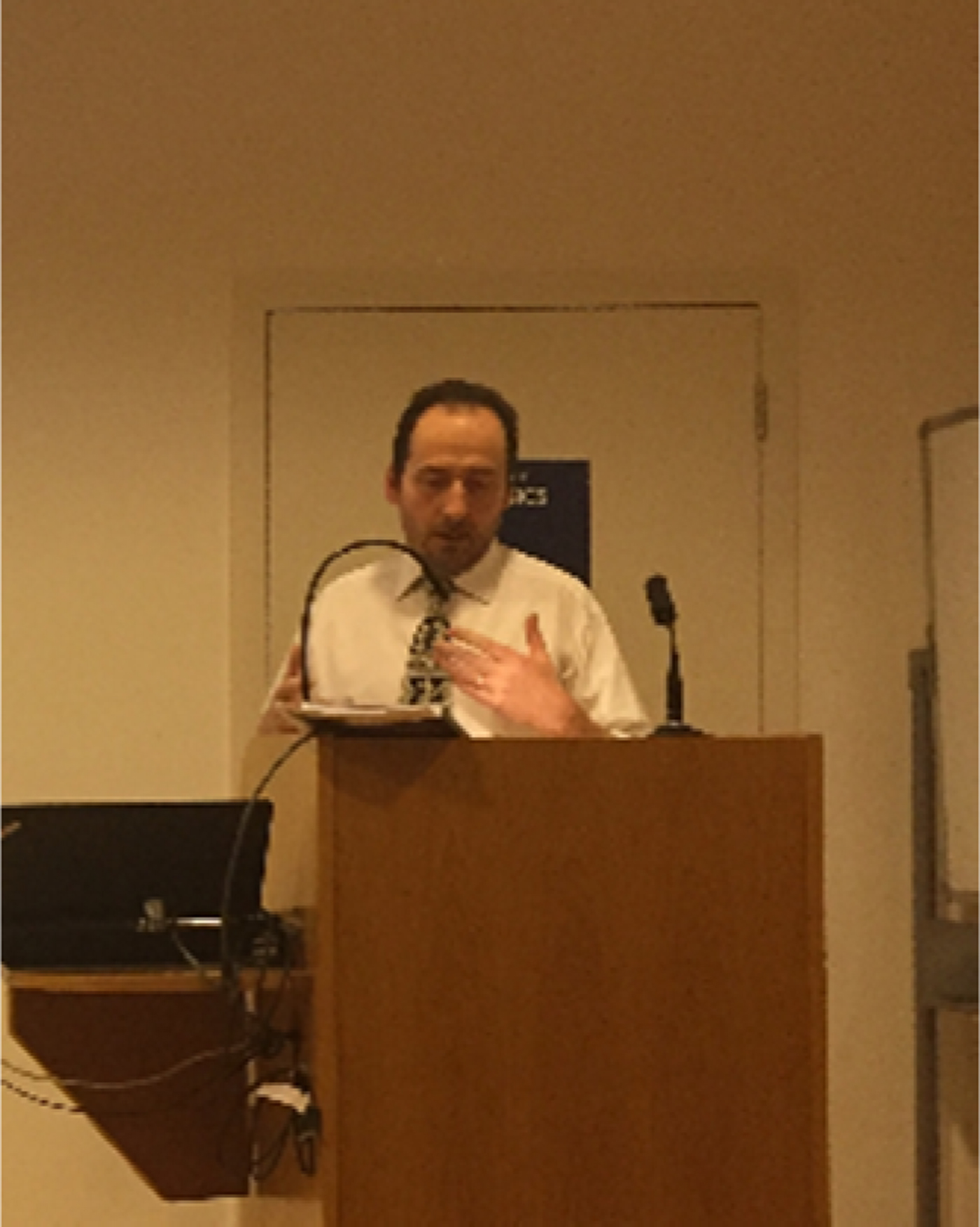
Llewellyn Morgan
The introduction was given by Dr. Llewellyn Morgan of Oxford University on the subject of how Classics in Communities came into being at Oxford and the importance attached still to the study of Classical languages, literature and society in universities and, especially, schools.
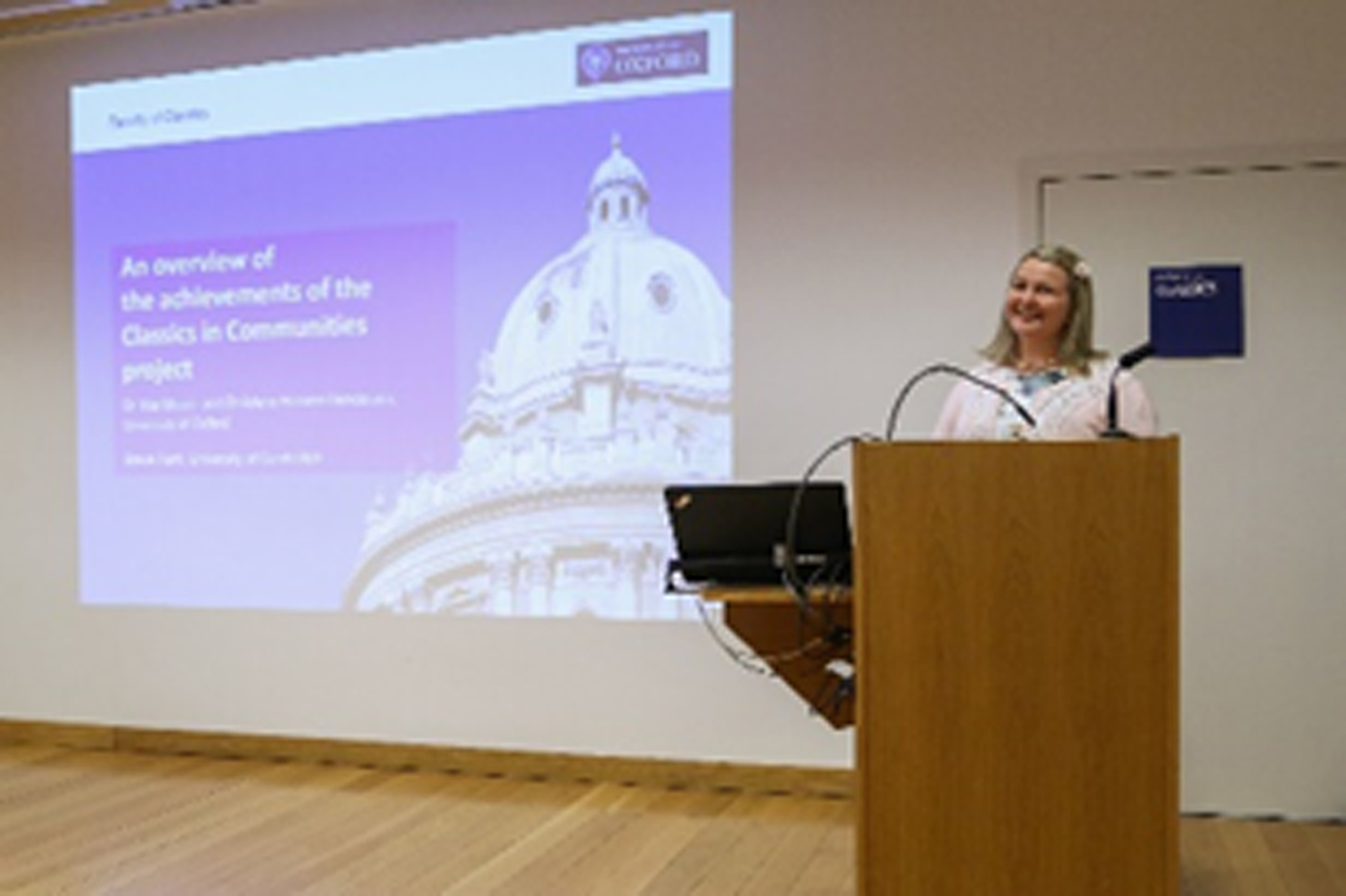
Arlene Holmes-Henderson
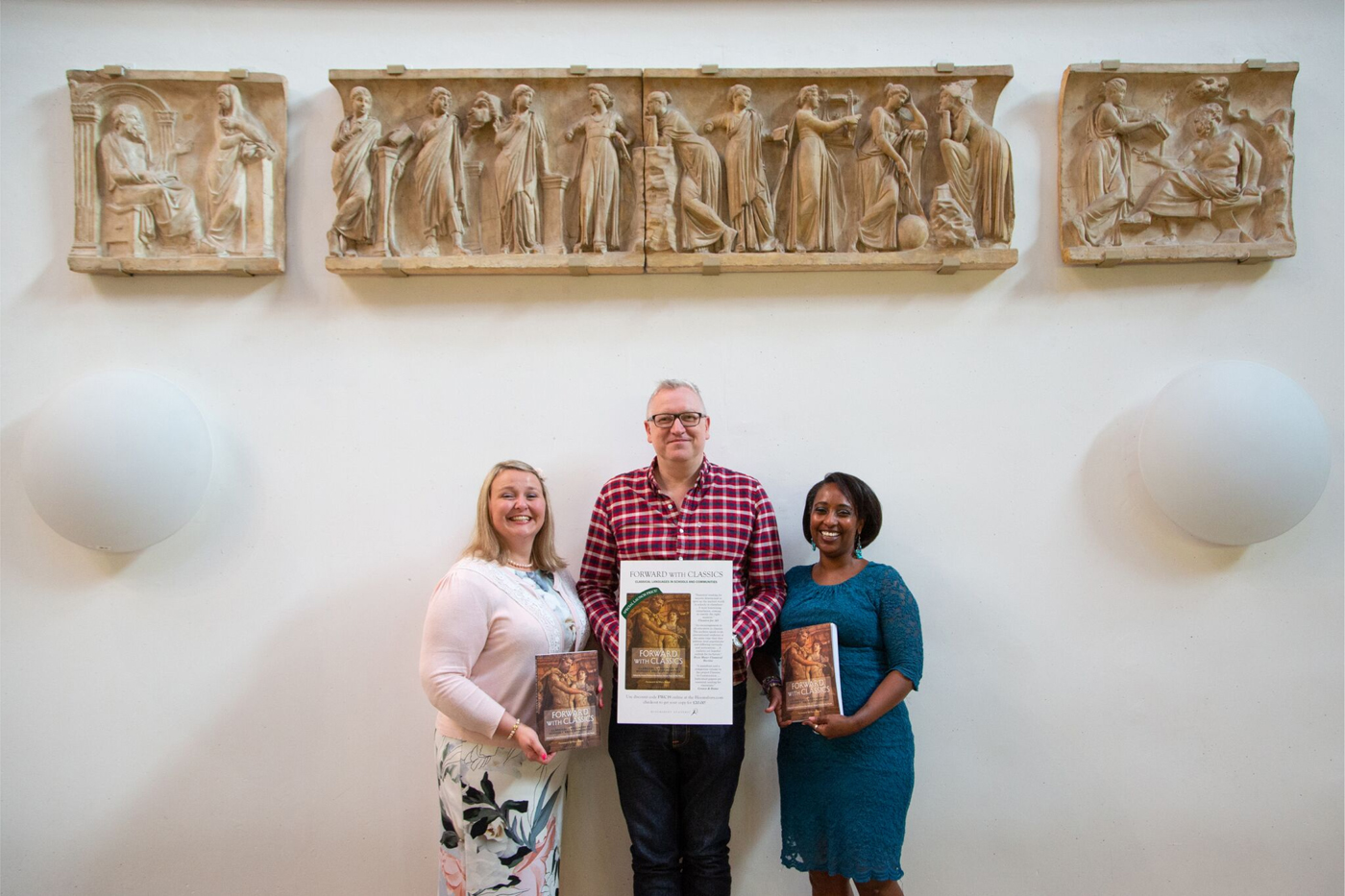
Arlene Holmes-Henderson, Steven Hunt and Mai Musié
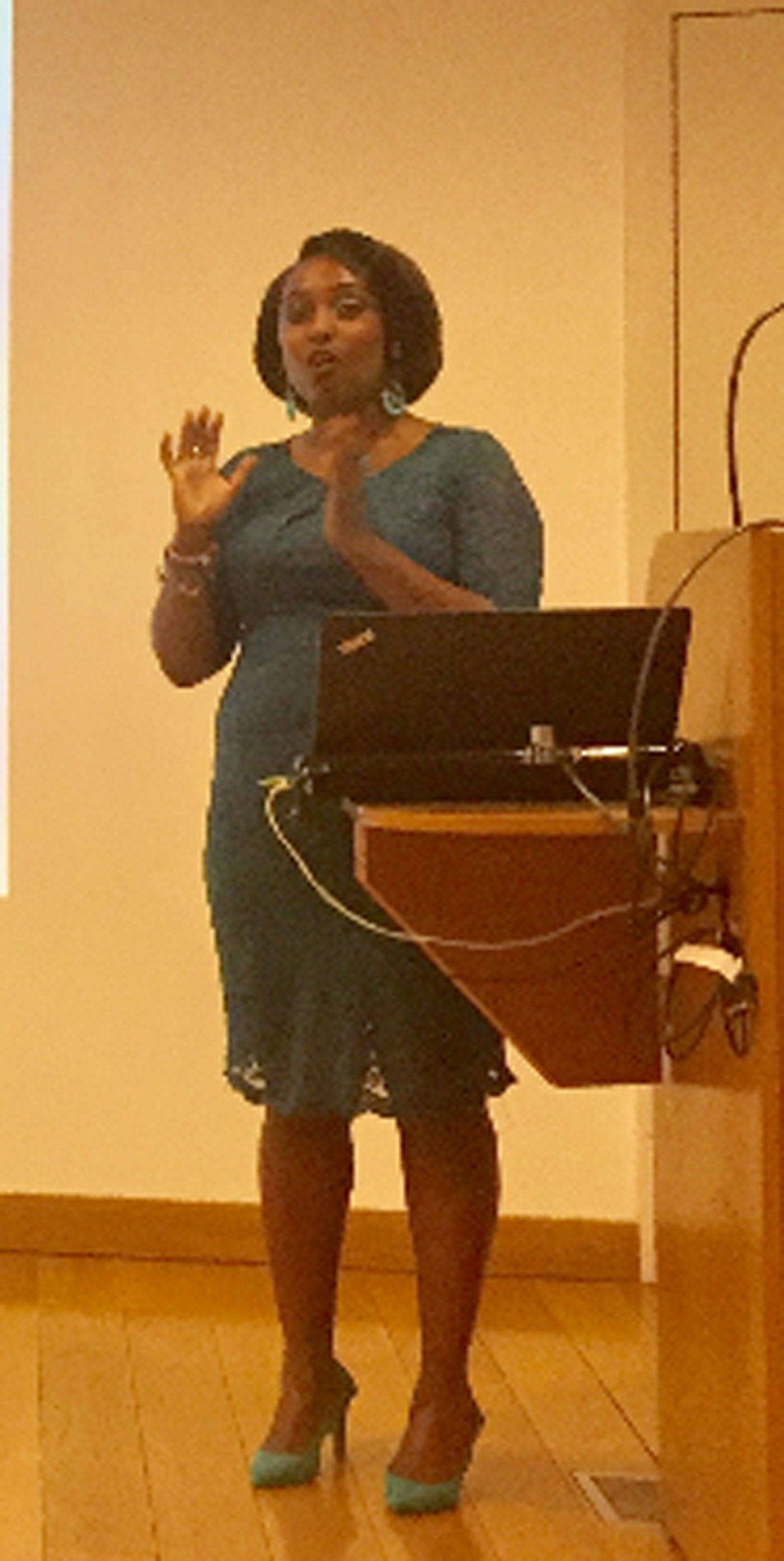
Mai Musié
Mai Musié, Arlene Holmes-Henderson and Steven Hunt, the editors of Forward with Classics! would like to thank their supporters for helping them launch the book Forward with Classics! showcasing their project Classics in Communities. Special thanks go to Llewelyn Morgan, Christopher Pelling, and the rest of the Faculty of Classics in Oxford who supported this project from its infancy as well as academics from the Faculty of Classics at Cambridge (incl. Mary Beard, Richard Hunter, and Tim Whitmarsh). They were delighted to be joined by some of their many contributors - Edith Hall (KCL), James Robson (Open University), John Bulwer (EuroClassica), Olivia Sanchez (St Paul's Ways Trust School), and Aisha Khan-Evans (KCL). They were delighted also to reveal their new look for the Classics in Communities website. Please share it among colleagues and teacher friends. They hope it will be of great resource in spreading the ‘Classics for All’ message.
Speakers at the event made the following points:
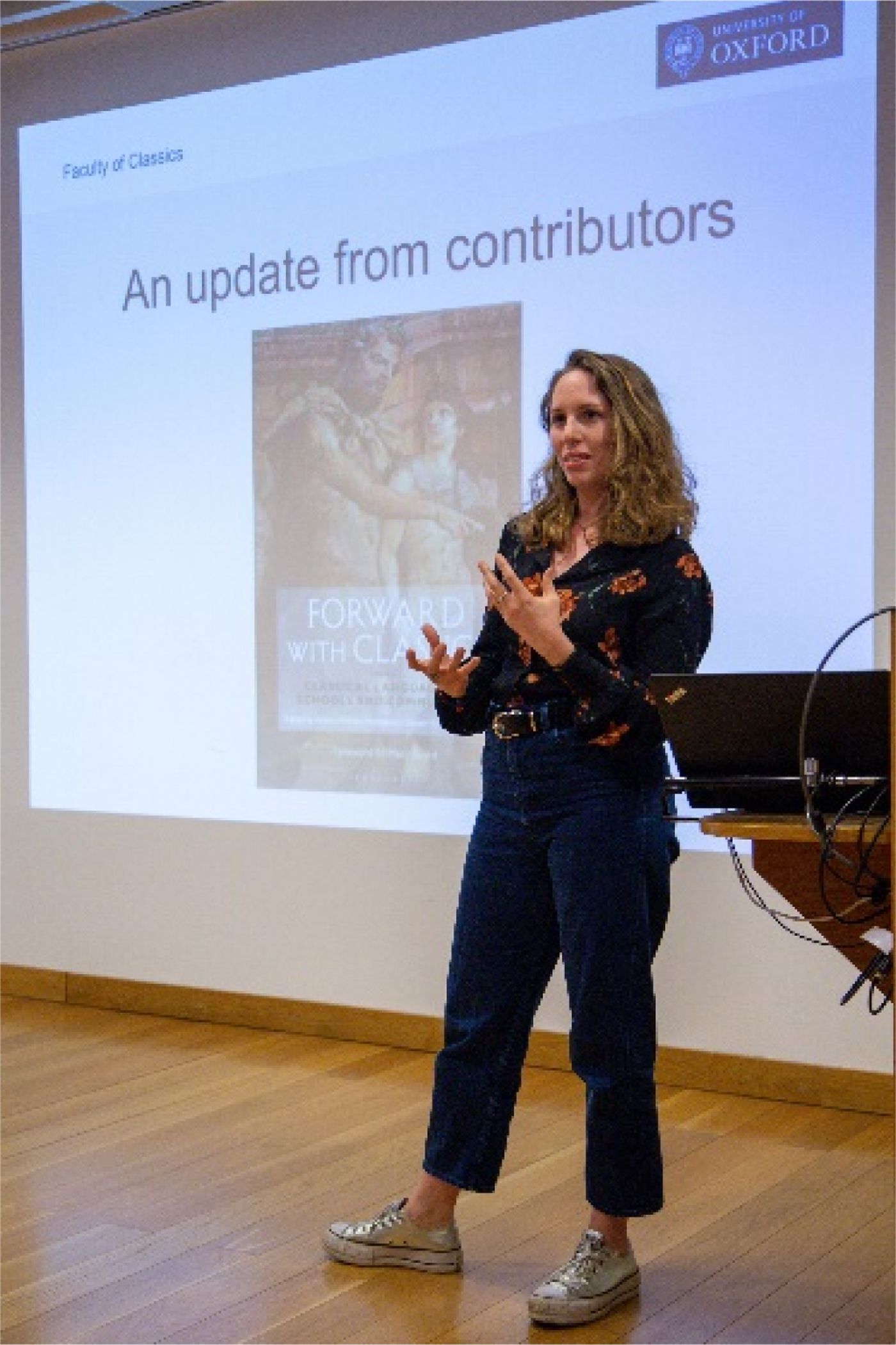
Olivia Sanchez
Olivia Sanchez is a teacher of Classics in a non-selective school in East London. What thoughts and ideas had she developed since the publication of Forward with Classics? Olivia referred to the importance of conveying knowledge about the classical world for students to acquire cultural capital - something which is identified in the new Ofsted framework as one of the purposes of a broad and balanced curriculum in schools. This is currently offered to students in her own comprehensive school in East London in a ‘grammar stream’ within the whole school. She is developing evidence to persuade the senior leadership to expand the curriculum offer to enable more students to study Classics. Her research follows a number of interconnected strands:
Might a stronger focus on reading comprehension of complete texts rather than on written translation be more attractive and inclusive to more students?
Might teaching about classical civilisation through more reading of Latin texts encourage better learning about the civilisation through the Latin story rather than as an add-on English afterthought?
How can we meaningfully develop literacy for all our students - what does improved literacy actually mean?
Olivia is wanting to look at the data again - many of the top-set students who are selected to do Latin don't actually receive Pupil Premium. She needs to ensure that Classics is truly for all. What is dissuading PP students from continuing with Latin and what are the issues that affect students' uptake of Latin at GCSE?
Who are the other staff within the school community with whom she might be able to develop professional relationships to support Latin in her school?
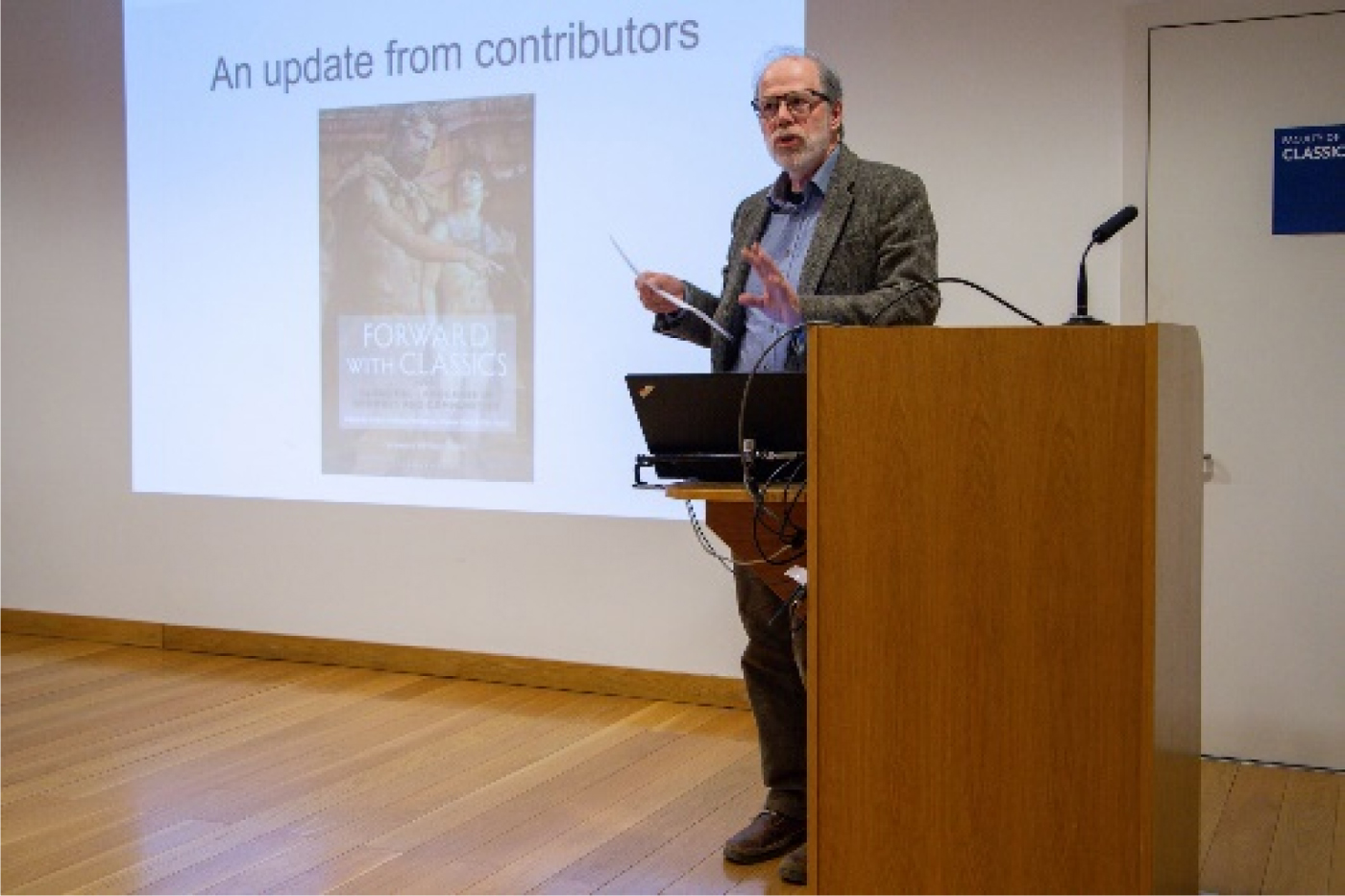
John Bulwer
John Bulwer, President of Euroclassica, gave an update on movements in Classics teaching in continental Europe. Common features of debate face Classics teachers across Europe. What is the right balance between teaching language and civilisation? Who is our audience? What does Classics look like in the primary sector? In the secondary sector how can we make Classics more accessible across the ability range? Across students from different strands in society? For boys and for girls? For students from ethnic minorities? To follow or subvert political affiliations or beliefs? Some countries have a strong base in Classics. Others are much smaller. Even in countries where all schools are state schools, schools are seen as elitist where Latin or Greek is taught. In small countries like Belgium, there don't seem to be many differences. But then again even in small countries like the Netherlands there is a strong tradition of Latin only in the academic schools which prepare students for the universities. In Italy the exam system hasn't changed since the 19th century, but there is now a movement to using the rich cultural resources of the country itself.
There is considerable interest in learning Latin in primary schools in Spain, Portugal and France. Living Latin seems to be taken seriously but there are anxieties about the speed of progress.
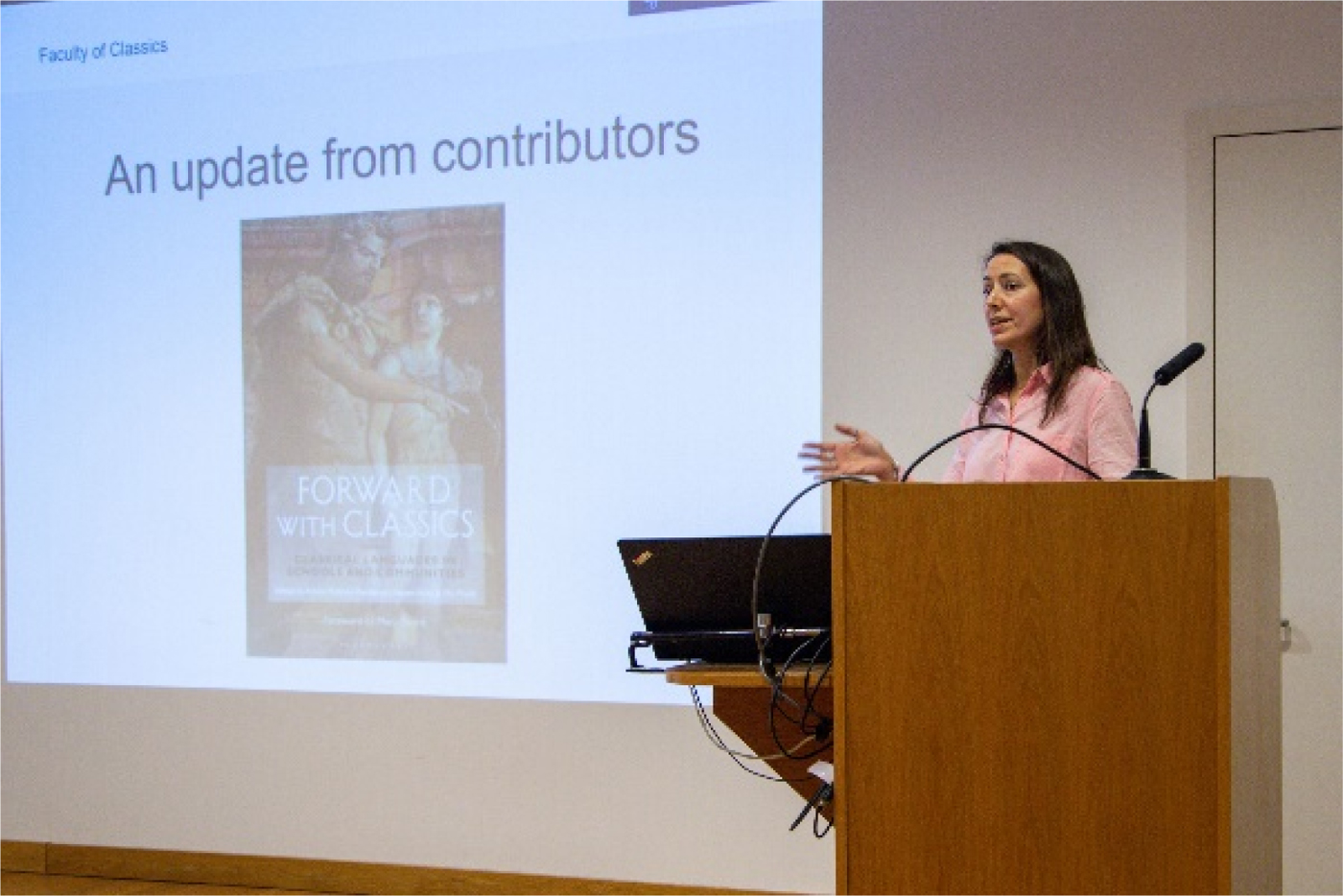
Aisha Khan-Evans
Aisha Khan-Evans (Subject Lecturer for the PGCE in Latin at King's College London) recalled her own experiences of working in a big school where there is the opportunity to influence children from Year 7; but she was struck by the diversity of the students who were attracted to take A-level Classical Civilisation. The idea of novelty - a new stretching, challenging subject - a subject with no negative connotations. Once hooked, the appeal seemed to be maintained. She thought the appeal derived from the ideas that the subject brought up: interesting, intriguing, fun, messy, diverse - a lens to look at the past, present and future. The decoupling of the AS from A-level has had a negative effect on take-up. There is a very detectable increased pressure on 16-year olds to ‘make the right choices’. Many schools are only offering 3 A- levels. Numbers of students taking A-level Classical Civilisation seem to be taking a hit. A positive thing is the breadth of the new specifications and topics. Students are positive and optimistic that Classical Civilisation is a way into the classical world.
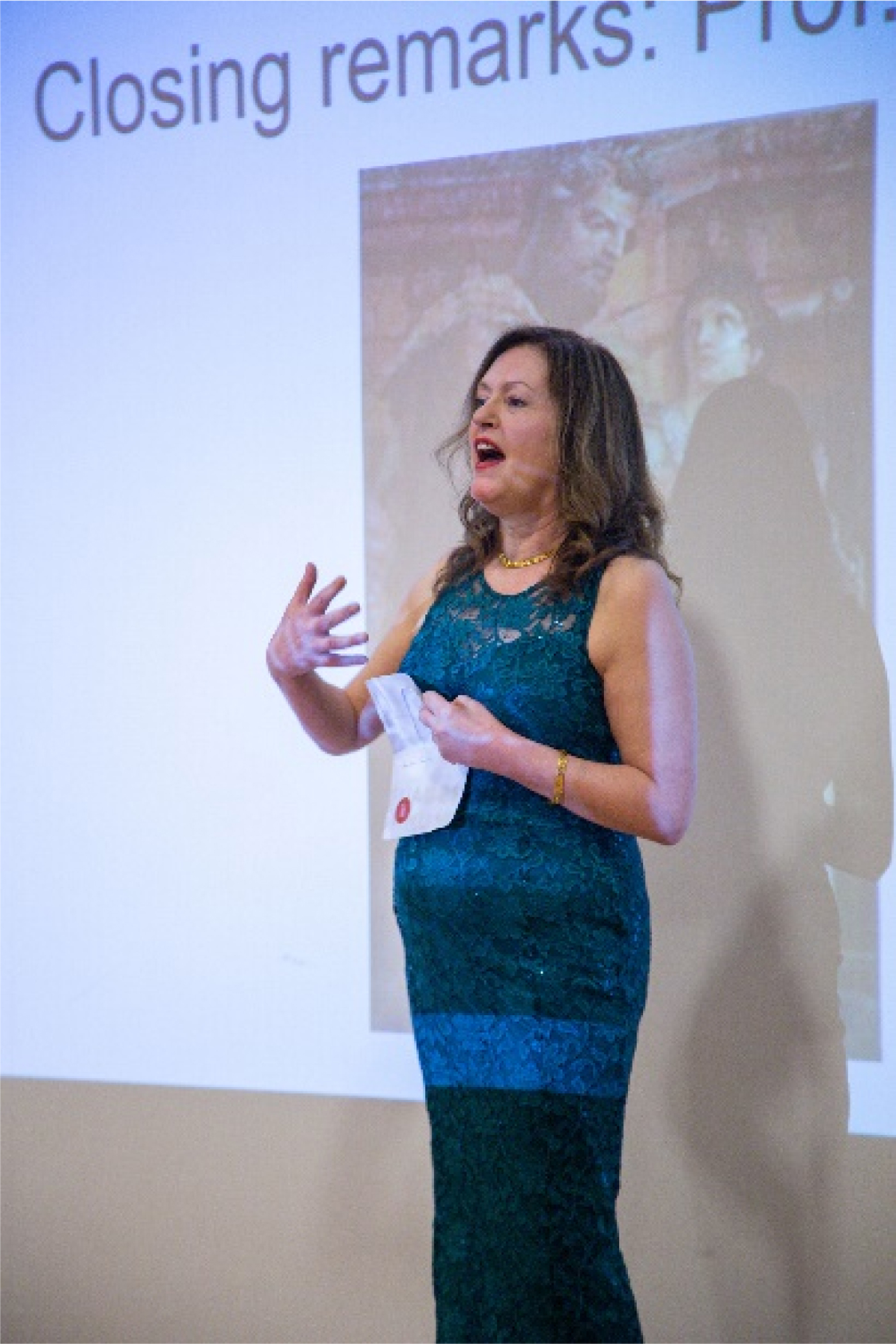
Edith Hall
Edith Hall, Professor of Greek at King's College London ended the speeches with her imaginative and upbeat style. What's wonderful about the movement - including the organisations Classics for All and ACE – is that they have significantly made collaboration between teachers, teacher trainers and academia normal. We are on the cusp of creating a national model for producing the citizen of tomorrow through the Classics. The 1940s-1970s was the reign of the grammar schools. Their decline she used to think was a shame as it seemed to suggest this was the drying up of the supply of Classics students. But now we have the opportunity to provide Classics for all. The book is written by a fully diverse group and it has stopped people inside the field from attaching pedagogies and interests, such as Classics in translation. This can, for example, provide the rhetorical training for students to use words better and more powerfully. Co-operation has improved. Outreach is valued. And there is money for grants for research into Classics education.
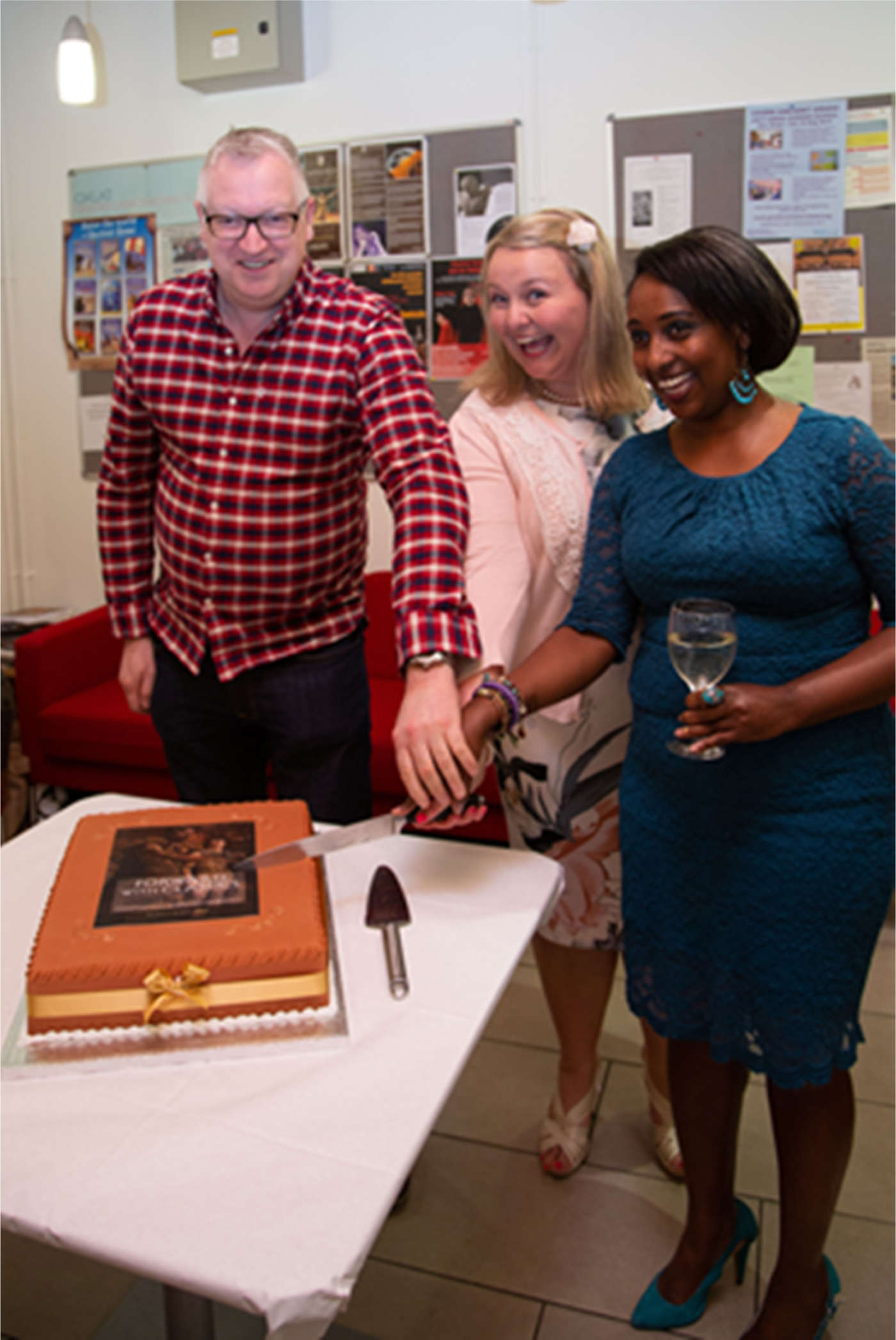
Steven Hunt is Subject Lecturer for the PGCE in Latin (with Classics) at the University of Cambridge and (disclaimer) an editor of Forward with Classics! and Editor of the Journal of Classics Teaching. He recounted the story of when he was invited to the DFE to talk to the civil servant who'd been charged with the job of restoring Latin and Greek to the classroom. ‘The Minister wants to level the playing field between the public and private sectors. Latin is one of the ways. Any ideas? We need levers to achieve it. But, (he was slightly apologetic), ‘there's no money for it.’
One of the main characteristics of policy-making of the last 20 years or more has been that of outsourcing. If we Classicists wanted something badly enough, we'd have to pull the levers - no! - make the levers and pull them ourselves. This book - Forward with Classics! - is, he thinks, along with the Classics in Communities Conferences of 2013 and 2015, one of the major levers by which we can start to get more Classics into schools (and notice he includes non-linguistic Classics in there too).
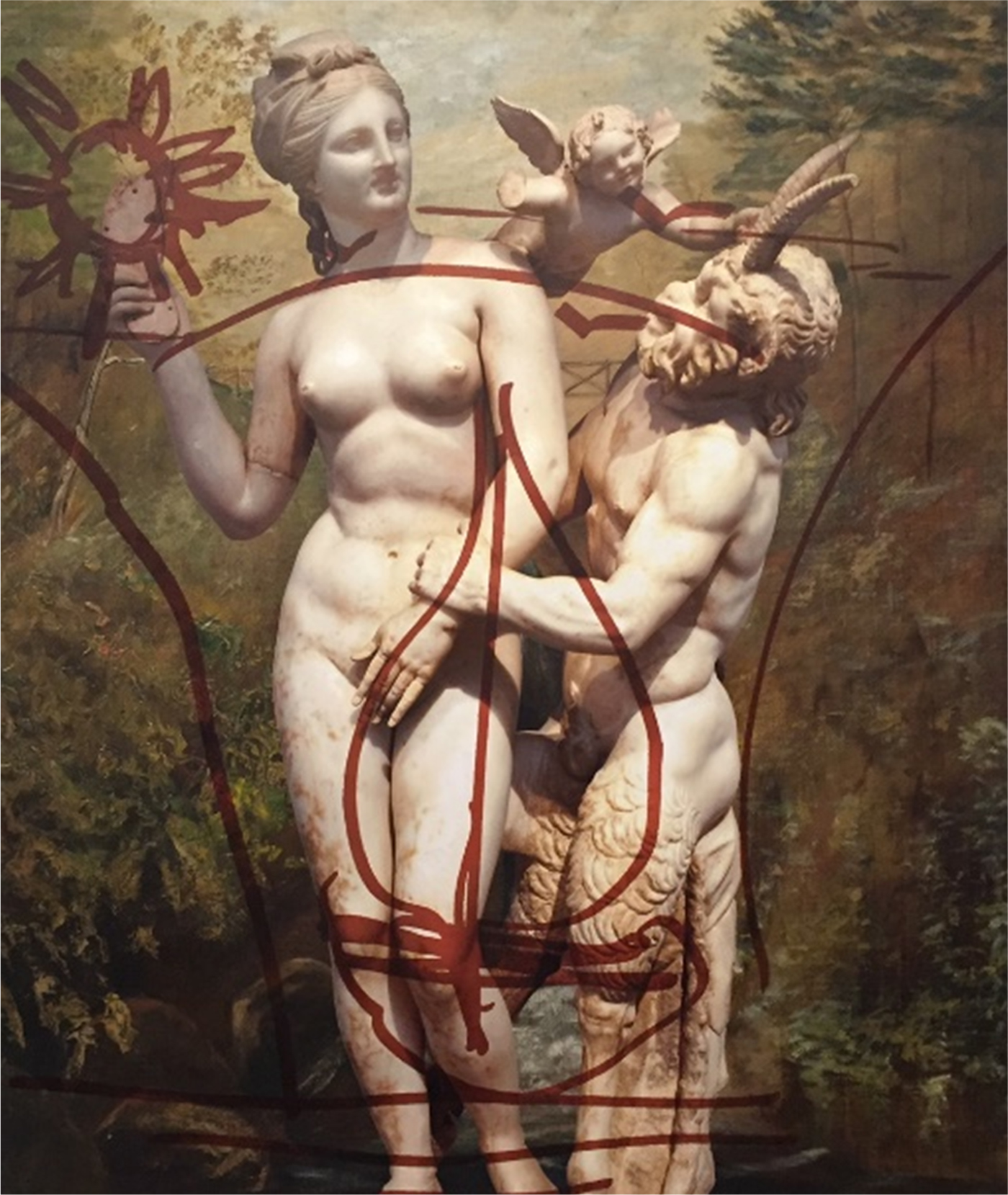
Jeff Koons exhibition
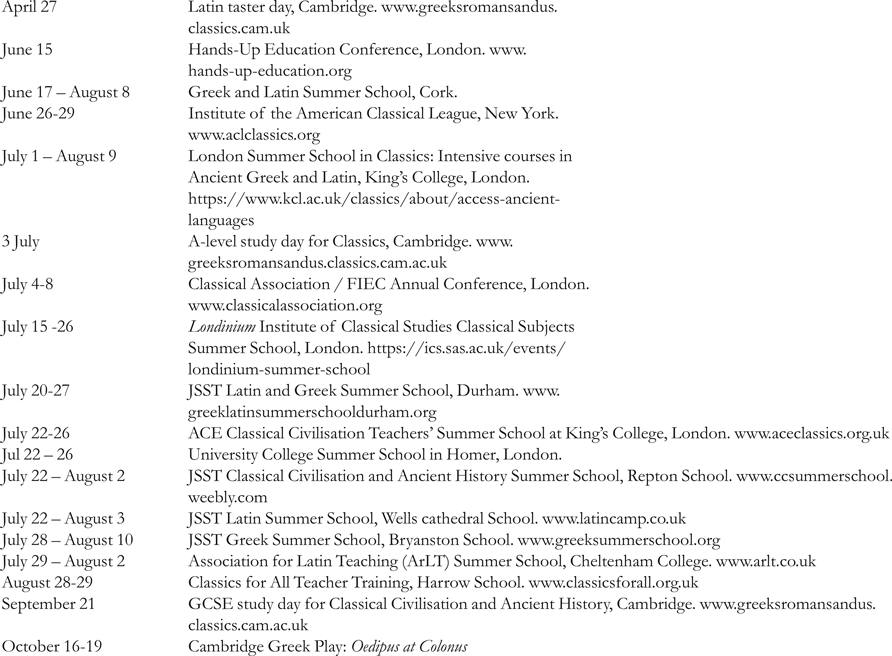
Stop Press
The English National Opera is putting on an Orpheus season at The Coliseum in London
October 1 – November 19: Gluck – Orpheus and Eurydice
October 5 – November 28: Offenbach – Orpheus in the Underworld
October 18 – November 13: Birtwhistle – The Mask of Orpheus
November 15-29: Glass - Orphée


